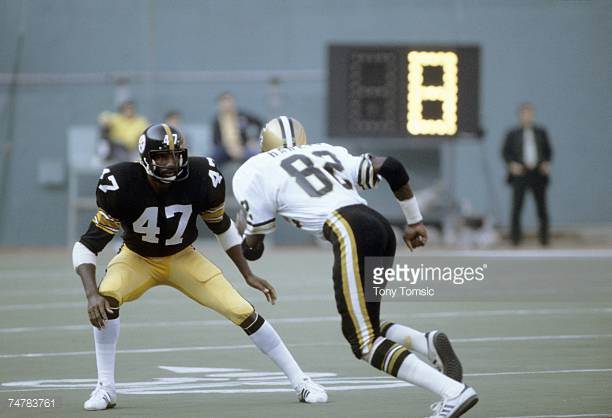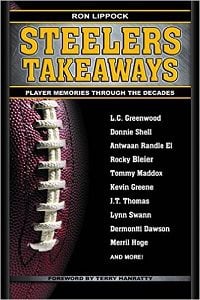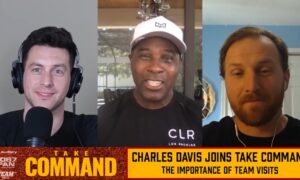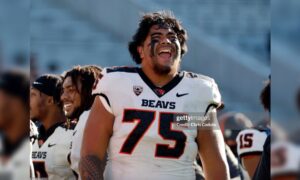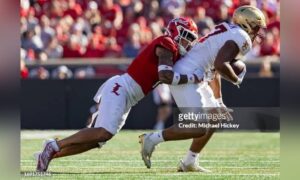Bringing you another Pittsburgh Steelers’ interview courtesy of our good friend Ron Lippock of the Pittsburgh Sports Daily Bulletin. We have an amazing one for you today. Here’s Ron’s recent interview with Steelers Hall of Famer Mel Blount, a man who needs no introduction. They talk about the Youth Home he’s set up after his playing days and the old-school way he found out the Steelers drafted him.
Be sure to check out Ron’s book, Steelers’ Takeaways: Player Memories Through The Decades, featuring over 400 interviews with players and coaches, past and present. You can buy it on Amazon through the link provided here.
First, I spoke with former Steeler CJ Goodwin a short while ago and he praised the Youth Home and how it helped him. How did you get started with the youth home – what inspired the idea – and how has the team and city helped the youth home succeed?
The Mel Blount Youth Home was inspired years ago – in 1979-1980. It was soon after our last Super Bowl. I grew up in a small town in Vidalia, Georgia. We were dirt farmers and lived in a small community I was the first athlete from there and the first to win something like a Super Bowl.
When I went back home, all the kids would call me Uncle Mel. The kids would come to the farm and get autographs, take pictures with me and throw the football around. That’s when the Lord spoke to me. I knew I could do more than just sign autographs for the kids. It made me want to do more.
My brother and I started talking about how we we could do more and work with kids, and starting throwing ideas around. We talked about how it was on the farm with the kids – remember, this was before social media and cell phones. It was a big deal for the kids to see someone in person that they saw on TV.
I retired in 1984, and fast-forward five years later we came to Pittsburgh and opened the facility, We’ve worked with kids from tough environments to give them safe environments. To teach them the fundamentals of life. Faith, family, hard work and education. We provide a safe haven for kids. We’ve helped a lot of kids get their GEDs, got some of them through high school and college.
Chuck Noll always said we should get on with our life’s work and that’s I guess what I’m doing now.
How can people help support the home?
We couldn’t do it without the support of the corporate community and fans. It would be very difficult without the funds we raise. It helps to have the support because I played for the Steelers but still it’s tough. We get a tremendous foundation of support through the community.
Fans can help by donating directly by check or through the United Way. you can also find us on Facebook (Ed Note: Click here) and can reach out to us to volunteer to help out with things here or just reach out to find out how you can get more involved. Just make us aware you want to get involved.
How hard was the post-NFL adjustment for you – how did you find your “next calling”?
I was fortunate. When I retired from the Steelers I worked for Pete Rozelle for six years in the league office. This is how I was able to go from football to the corporate world. It was a grace period to figure out what I wanted to do,
And you’re right. It’s difficult doing something all your life, since you were a kid until you are thirty-five or so, then stopping and finding your next calling. Those days players didn’t have the tools that players have now. Job programs and counseling…It’s difficult but the job with the NFL was a good bridge to the next phase of my life.
Stepping back. Were you surprised to be drafted by the Steelers?
I was surprised. I didn’t know anybody on the Steelers. They weren’t a good team then. It’s funny because sometimes what you think is the best thing for you isn’t always the best thing. It turned out it was the best thing that ever happened to me. It gave me the opportunity to grow and adjust to that kind of life,
In college, I had nothing from the clothes on my back. You go from that to getting checks and cars and money. It was a big adjustment.
How did you find out you were drafted?
The coaches had to come find me on campus. There wasn’t the build-up to the draft like there is today. The coaches told me to go to the coaches office and we called the Steelers. I talked with Art Rooney – he was the scout then. I was disappointed. I went in the third round and like everyone, I thought I should have been a number one pick. But it turned out to be a blessing.
Who were some of your mentors both on and off the field when you got to Pittsburgh and how did they help you?
Joe Greene was in his second year there, and it didn’t take long to figure out he was the leader in the locker room. He was a tremendous athlete but he was also a tremendous influence and mentor throughout my career. We became roommates and best of friends. His kids called me Uncle Mel and mine called him Uncle Joe. Every locker room has somebody who is the established leader and in ours that was Joe,
How did he help you most?
The biggest help a player can give is to make a guy feel like they belong. That they are part of the team. Joe did that. He talked with me and counseled guys about the Steelers way. The things they should and shouldn’t do. It’s about setting the parameters for life and ensuring you’re feeling part of things.
A lot of guys spoke of your help on and off the field as mentors – how hard was that for you to mentor guys often looking to take playing time and how did you help them?
I’ve never been that person to be insecure in my ability. It’s about being a part of something. A team of men. And it takes all of us to win.
My ability and competitiveness kicked in and my hard work and desire to compete. So I never had that problem. That was one of the things with us. So many of us were great athletes. We gelled and really liked each other.
And winning cures a lot of ills. It brings you closer. It’s a tough business. We had problems but winning overwhelmed those other things, Every year we got more mature and understood more of what was expected of us. It was a beautiful thing.
What were some of the more memorable moments you experienced on and off the field – pranks, funny moments, etc.?
Looking back on my relationships with players, nothing like that comes to mind, It was more about how we were treating each other.
The guys – we all took each other under our wings. That’s the part of what we did to compete. In 1974, we had that great rookie class with Lambert, Swann, Stallworth and those other great players, That year Joe Gilliam came into camp after a preseason game and told us how great the rookies were. It was a strike season, but when we came back we told them we went on strike for them too. To help them with their careers as well as winning championships. We embraced them. Those are the things I cherish. How that all unfolds in such a competitive sport.
As a physical cornerback, how frustrated were you when the changed the five-yard rule and how were you so successful at adjusting to it?
The rule change wasn’t a big deal to me. I think the coaching staff over-reacted. The change was something I embraced. But I’ll never forget they had all of the defensive backs come in in the offseason to practice a slide and glide technique. It was this different way of backpeddling and shuffling your feet since they didn’t think we could jam the receivers any more. But they were over-reacting. I could still jam the receivers in that five yard space. I used the five yards I had to my advantage and still made All-Pro and all of that.
I think some people were less tolerant of our success and wanted to legislate changes to help them win. Paul Brown was on the rules committee then and he pushed for the changes. He was tired of us kicking their butts twice a year so he used this as a way to compete. That’s my opinion on it anyway.
Any last thoughts on the game today?
It’s obviously a different game than when we played in the 70’s. Talking about legislating the game, I think many of the rules being implemented are by guys who never played it or don’t fully understand it. I know things have changed with concussions and player safety. But it’s still a great game. They need to straighten some things out. Like what is a catch. A lot of things are not clear and they need to change those so that coaches and players understand them better and referees aren’t confused. But I don’t get frustrated. You have to remember that they’re human beings. Everyone will make a mistake at times.
It’s a great game and a metaphor for life. There are obstacles to overcome, but you do it as a team. If you get knocked down, you dust yourself off and get back up. Because that’s what you have to do in the real world.

